You might think that every Ford Ranger engine is a powerhouse, but some truly stand out when it comes to performance and reliability. As you explore the top options, you'll discover how each engine contributes uniquely to the Ranger's reputation. From the fuel-efficient EcoBoost to the rugged V6 choices, these engines don't just promise power; they deliver longevity and ease of maintenance. So, which engines top the list, and what factors should you consider in your selection? Stick around to uncover the details that could shape your next decision.
Need tools for your project? Toolbox, a tool rental marketplace, might be worth a look.
Things to Note
- The Ford Ranger offers a range of engines known for their reliability and performance, enhancing driving experience.
- Efficient engine performance is supported by clean air filters, which improve horsepower and acceleration.
- Regular maintenance, including air filter replacements every 12,000 miles, optimizes fuel efficiency and engine longevity.
- High-quality air filters, like K&N and EcoGard, significantly enhance airflow and reduce engine wear.
ECOGARD Premium Engine Air Filter for Ford Ranger and Explorer
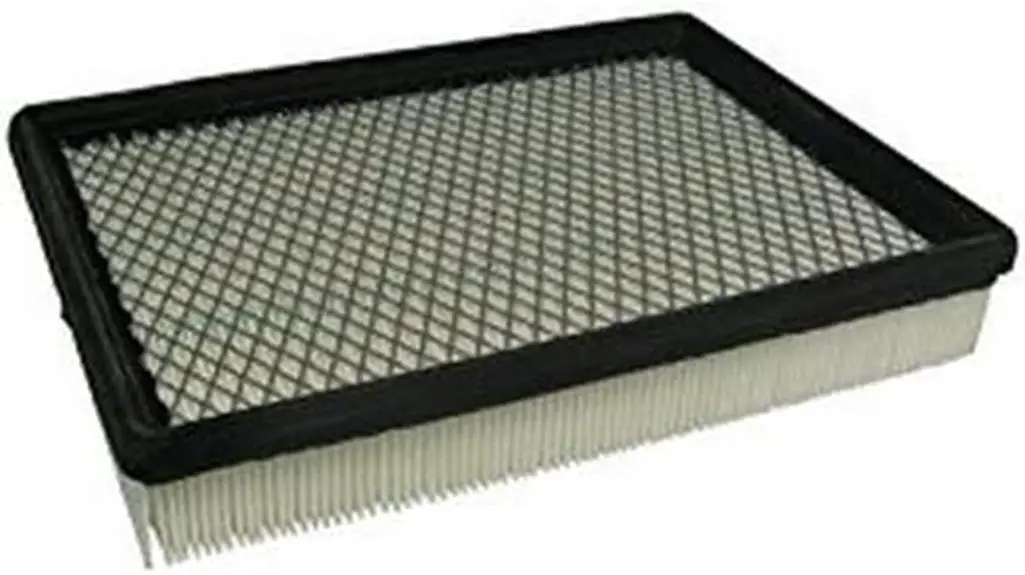
The ECOGARD Premium Engine Air Filter is an ideal choice for Ford Ranger and Explorer owners seeking enhanced engine performance and longevity.
This filter, model XA5192, fits various Ford, Mazda, and Mercury vehicles, ensuring compatibility across a wide range of models. It effectively replaces several OEM part numbers, making it a versatile option for those in need of a reliable air filter.
Regular maintenance is essential, and ECOGARD recommends replacing the filter every 12 months or 12,000 miles to maintain peak engine health.
By ensuring clean airflow, this filter improves acceleration and power while reducing engine wear caused by dirt and debris.
With a solid customer rating of 4.6 out of 5 stars, it's a trusted choice for many vehicle owners.
Best For: Ford Ranger and Explorer owners looking for a reliable and efficient engine air filter to enhance vehicle performance and longevity.
Pros:
- High compatibility with various Ford, Mazda, and Mercury models.
- Positive customer feedback with a solid rating of 4.6 out of 5 stars.
Cons:
- Limited to specific models, which may not suit all vehicle owners.
- Replacement frequency may add to maintenance costs over time.
K&N Engine Air Filter for 2015-2019 Ford Vehicles (33-3086)
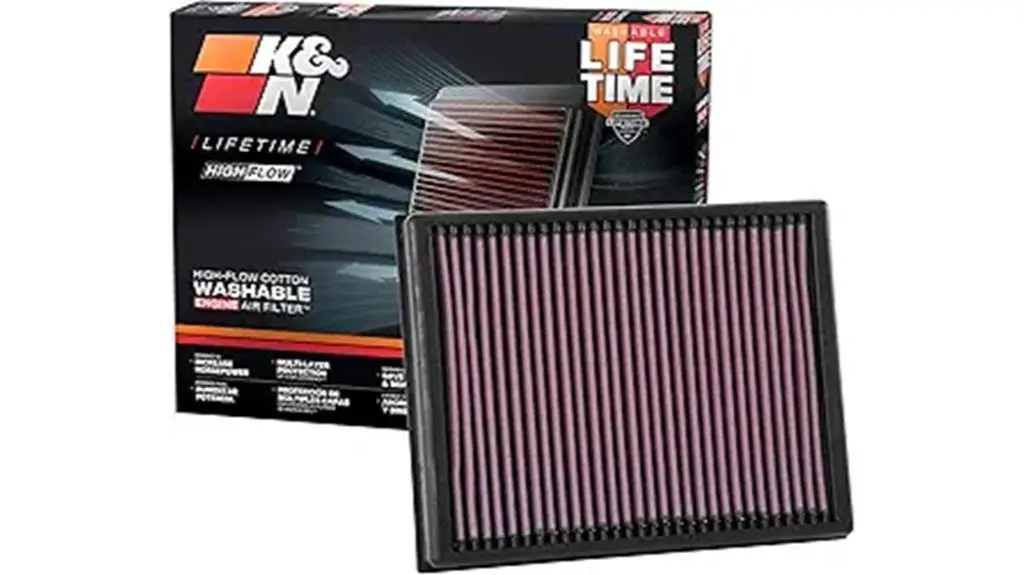
Designed specifically for 2015-2019 Ford models, the K&N Engine Air Filter (33-3086) boosts engine performance and fuel efficiency, making it an ideal upgrade for Ranger owners seeking enhanced power and savings.
This washable and reusable filter is constructed from durable materials, featuring six layers of premium cotton gauze to guarantee effective filtration.
Users have reported significant improvements in horsepower, acceleration, and fuel mileage, with some experiencing increases from 20.1 to 28.5 MPG.
Additionally, it enhances towing capacity, making it perfect for heavy loads.
With a no-hassle lifetime warranty and a maintenance schedule of 75,000 miles, this filter offers a cost-effective solution that can save up to $125 compared to disposable alternatives.
Best For: Ford owners looking to enhance their vehicle's engine performance and fuel efficiency while saving on long-term maintenance costs.
Pros:
- Improves horsepower and acceleration, offering better overall engine performance.
- Cost-effective with a lifetime warranty, reducing expenses on disposable filters.
Cons:
- Initial cost may be higher than disposable filters.
- Some users have noted a slight increase in fuel consumption.
A-Premium Front Engine Air Filter for Ford Ranger (2019-2023)
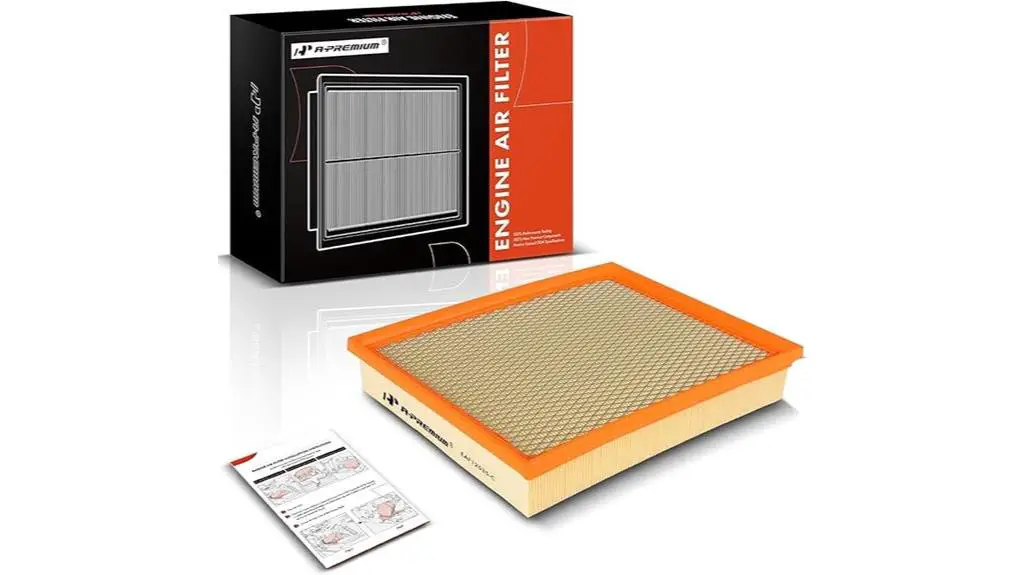
For Ford Ranger owners from 2019 to 2023, the A-Premium Front Engine Air Filter offers exceptional filtration to enhance engine performance and efficiency.
Designed for the L4 2.3L models, this filter captures harmful particles while maintaining ideal airflow. Its rectangular shape, with dimensions of 11.8 inches in length, 9.33 inches in width, and 1.98 inches in height, guarantees a perfect fit.
Users can expect improved engine performance and efficiency when replacing the filter every 12 months or 12,000 miles. Weighing just 1.17 pounds, it's easy to handle and install.
With a perfect rating of 5.0 out of 5 stars, this filter has quickly gained popularity, ranking #174,085 in Automotive on Amazon.
Best For: Ford Ranger owners from 2019 to 2023 looking to enhance their vehicle's engine performance and efficiency.
Pros:
- Provides exceptional filtration to capture harmful particles without obstructing airflow.
- Easy to handle and install, weighing only 1.17 pounds.
Cons:
- Non-washable and non-reusable, requiring replacement every 12 months or 12,000 miles.
- Limited to specific Ford Ranger models (L4 2.3L), which may not suit all users.
ECOGARD XA11777 Premium Engine Air Filter Fits Ford Ranger 2.3L 2019-2022
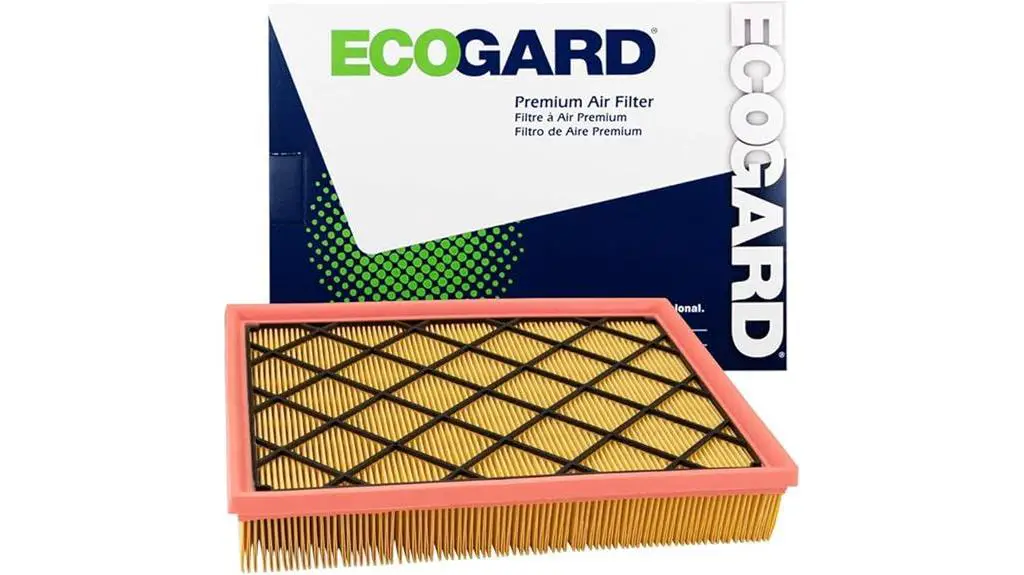
ECOGARD XA11777 Premium Engine Air Filter delivers exceptional performance for Ford Ranger owners with the 2.3L engine from 2019 to 2022, ensuring ideal airflow and reduced engine wear. This filter replaces several OEM part numbers, making it a compatible choice for maintaining engine efficiency.
Weighing only 12 ounces and measuring 13.4 x 10.9 x 2.2 inches, its factory-fit design allows for easy installation, often requiring few or no tools. Recommended for replacement every 12,000 miles or annually, it enhances engine performance by providing clean air flow, essential for acceleration and power.
With a customer rating of 4.7 out of 5 stars, users appreciate its quality, value, and easy installation, often noting significant savings compared to dealer prices.
Best For: Ford Ranger owners with a 2.3L engine looking for a cost-effective and high-quality air filter replacement.
Pros:
- Improves engine performance by ensuring optimal airflow and reducing wear from dirt and debris.
- Easy installation with a factory-fit design that typically requires few or no tools.
Cons:
- Replacement interval may require frequent purchases for those who drive over 12,000 miles annually.
- Limited compatibility as it specifically fits only Ford Ranger 2.3L models from 2019 to 2022.
ALL WELL Engine Air Filter for Ford Ranger (2019-2022)
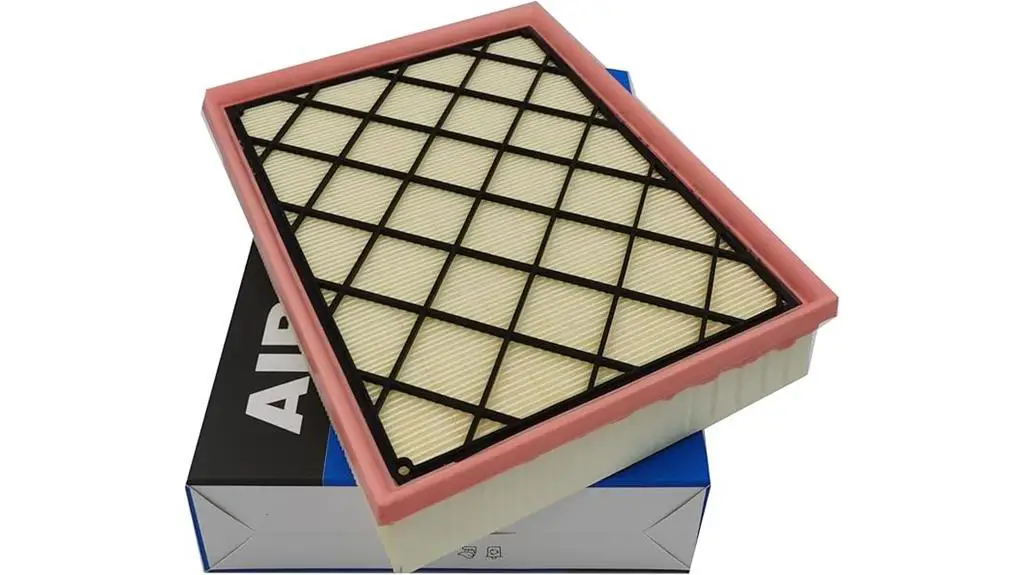
The ALL WELL Engine Air Filter greatly enhances the performance of Ford Ranger models from 2019 to 2022, ensuring ideal airflow and engine efficiency for drivers seeking reliability and quality.
This filter fits seamlessly into the factory air box of various Ranger trims, including Lariat, XL, and XLT, thanks to its 1:1 OE design.
Constructed from specialized embossed paper, it offers impressive crease stability and a large dust-holding capacity, contributing to longer intervals between replacements.
Weighing 14.9 ounces and measuring 15.94 x 13.19 x 2.24 inches, it's lightweight yet effective.
With a solid customer rating of 4.6 out of 5 stars, it's clear that users appreciate its performance.
Plus, it comes with a 30-day return guarantee, ensuring peace of mind.
Best For: Drivers of Ford Ranger models (2019-2022) seeking a reliable, easy-to-install air filter that enhances engine performance.
Pros:
- Easy installation with a 1:1 OE design that fits directly into the factory air box without modifications.
- High dust-holding capacity and excellent crease stability due to specialized embossed paper construction.
Cons:
- Limited compatibility as it only fits specific Ford Ranger models from 2019 to 2022.
- Weight and dimensions may not suit all users' preferences for lightweight products.
FRAM Extra Guard Flexible Replacement Engine Air Filter for 2019-2023 Ford Ranger
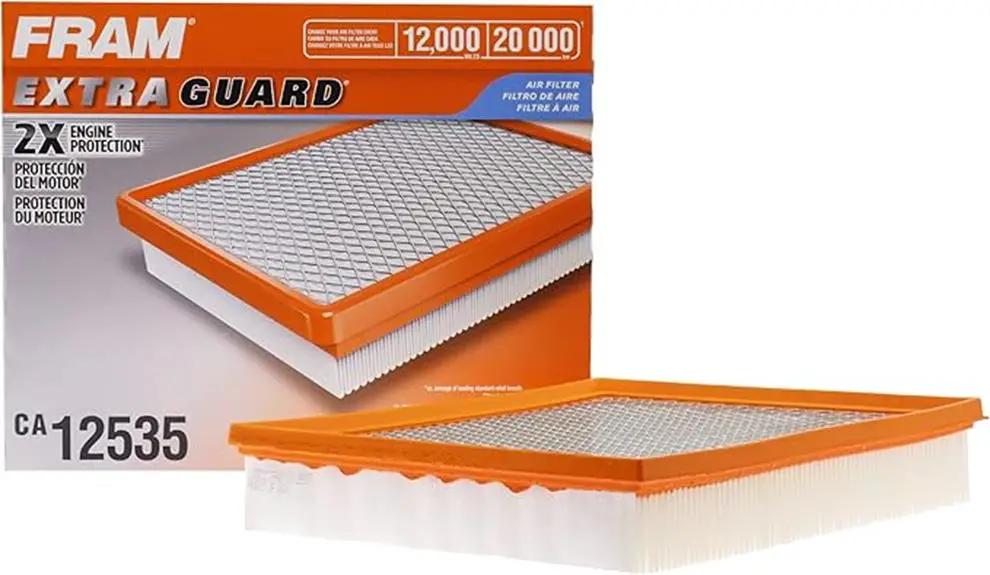
Designed specifically for the 2019-2023 Ford Ranger with a 2.3L engine, the FRAM Extra Guard CA12535 Flexible Replacement Engine Air Filter offers double the protection compared to standard filters, ensuring superior engine performance.
This filter provides up to 12 months or 12,000 miles of reliable service, enhancing airflow while effectively capturing dirt and debris. Its advanced media design prevents engine clogging, promoting smoother horsepower performance and overall efficiency.
Installation is a breeze, allowing users to replace the old filter in minutes without any professional help. Weighing just 0.8 ounces and with compact dimensions, it's easy to handle.
With a solid 4.1-star rating, customers appreciate its effectiveness and the 30-day return guarantee adds extra peace of mind.
Best For: Those seeking an easy-to-install, high-performance air filter for their 2019-2023 Ford Ranger that enhances engine efficiency and protection.
Pros:
- Double protection compared to standard filters, ensuring better engine performance.
- Easy DIY installation allows for quick replacement without professional assistance.
Cons:
- Limited to specific vehicle applications, may not fit other models.
- Weighs only 0.8 ounces, which might raise concerns about durability for some users.
PurolatorONE Advanced Engine Air Filter for Ford Ranger
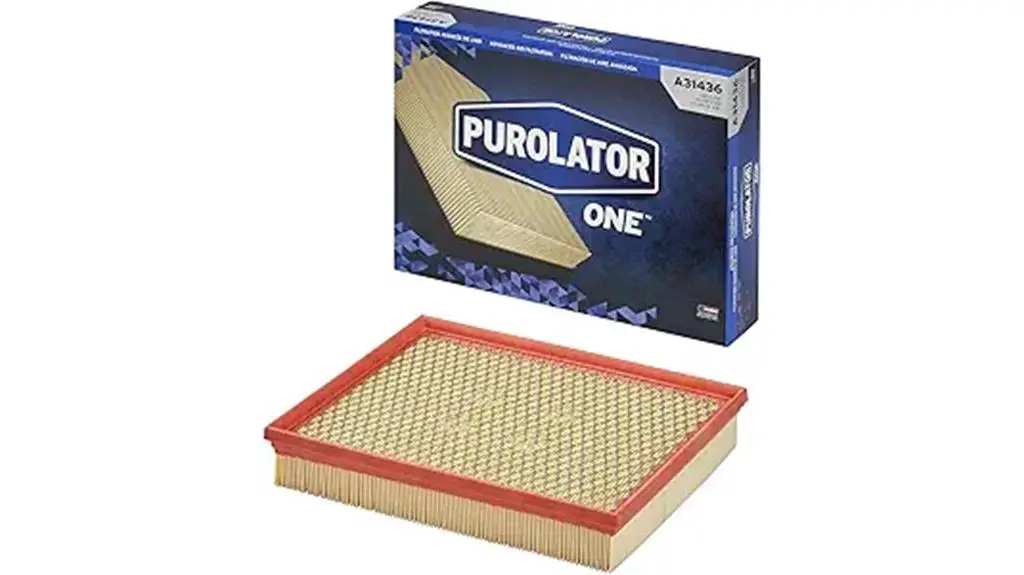
For Ford Ranger owners seeking to optimize engine performance, the PurolatorONE Advanced Engine Air Filter stands out with its ability to trap up to 99% of dirt and debris.
This high-quality filter, weighing just 1.1 pounds, features a multi-fiber, high dirt trapping media designed for longevity.
By replacing the air filter every 12 months or 12,000 miles, drivers can enhance acceleration by up to 11%, reduce engine wear, and improve fuel efficiency.
Its easy installation process and compatibility with various Ranger models make it a popular choice among users, who rate it 4.8 out of 5 stars.
With its strong performance and positive customer feedback, the PurolatorONE filter proves to be an essential upgrade for any Ranger owner.
Best For: Ford Ranger owners looking to enhance engine performance and improve fuel efficiency through a high-quality air filter replacement.
Pros:
- Traps up to 99% of dirt, soot, and debris, ensuring better engine protection.
- Easy installation process compatible with various Ford Ranger models.
Cons:
- Limited to select Ford Ranger models, which may not suit all vehicle owners.
- Replacement frequency of every 12 months or 12,000 miles may require regular maintenance.
Factors to Consider When Choosing a Ford Engine for Ranger
When choosing a Ford engine for your Ranger, you'll want to contemplate several key factors.
Look at engine performance metrics, fuel efficiency ratings, and compatibility with your specific model.
Don't forget to think about maintenance requirements and filter replacement intervals, as these can impact your overall ownership experience.
Engine Performance Metrics
Engine performance metrics, including horsepower, acceleration, and fuel efficiency, play an important role in determining which Ford engine is best suited for your Ranger. When selecting an engine, consider how these metrics will impact your driving experience. Higher horsepower means more power at your disposal, enhancing your ability to haul loads or navigate challenging terrains.
Acceleration is another important metric. A responsive engine can greatly improve your Ranger's performance, especially in urban settings or when merging onto highways. You'll want an engine that offers quick acceleration to keep you safe and confident on the road.
Don't overlook the importance of maintaining your engine air filter, either. A clean, high-quality air filter guarantees ideal airflow, which is essential for efficient combustion and power generation. Regularly replacing your air filter, usually every 12,000 miles or annually, can improve acceleration and prevent engine wear caused by dirt and debris.
Fuel Efficiency Ratings
Understanding fuel efficiency ratings is fundamental in selecting the right Ford engine for your Ranger, as these ratings can greatly impact your driving costs and environmental footprint. Fuel efficiency varies by engine type, with some Ranger models achieving mileage between 20.1 to 28.5 MPG. This variation can be influenced by factors like the engine air filter.
Regularly replacing your engine air filter is vital for enhancing fuel efficiency. A clean air filter guarantees ideal airflow, reducing engine strain and potentially increasing your mileage. Studies have shown that replacing a clogged air filter can improve both acceleration and overall engine performance, leading to better fuel economy.
The quality of the air filter also plays a significant role. High-quality filters can trap up to 99% of dirt and debris, helping to maintain efficient fuel consumption. To sustain ideal fuel efficiency and keep your engine healthy, it's generally recommended to replace the engine air filter every 12,000 miles or annually.
Compatibility With Models
Choosing the right Ford engine for your Ranger involves considering compatibility with specific model years and engine sizes to guarantee peak performance. For example, if you're looking at engines from 1998-2011, you'll often find options like the 3.0L and 4.0L. If your Ranger is newer, the 2.3L engine from 2019-2023 might be the right fit.
When selecting an engine, check that it matches OEM part numbers designed for your specific Ranger configuration. Many filters are tailored to replace these parts, such as EB3Z-9601B or FA1943, ensuring a seamless fit.
Don't overlook maintenance intervals recommended for your model. Most filters suggest a replacement every 12,000 miles or annually to keep your engine running smoothly. The choice between washable, reusable filters and disposable ones can also affect your long-term costs and environmental impact.
Lastly, look into customer feedback and ratings for the filters that fit your Ranger model. Higher ratings usually indicate better performance and compatibility with specific engine types, helping you make an informed decision that enhances your Ranger's capabilities.
Maintenance Requirements
When it comes to selecting a Ford engine for your Ranger, regular maintenance requirements play an essential role in ensuring ideal performance and longevity.
One of the key aspects is the engine air filter. You should replace it every 12 months or 12,000 miles to maintain optimal engine health. A clean air filter improves airflow, which directly enhances your engine's acceleration and power. Conversely, a dirty air filter can lead to increased engine wear and reduce both the lifespan and efficiency of the engine.
Moreover, the type of air filter you choose can considerably impact fuel efficiency. Some filters are designed to boost mileage, making them a worthwhile investment for your Ranger.
Following the manufacturer's recommendations for maintenance is vital, as it helps prevent issues related to engine clogging, ensuring smooth operation and better overall vehicle performance.
Filter Replacement Intervals
Regular maintenance, like timely air filter replacements, is just one of the factors to contemplate when selecting the right Ford engine for your Ranger.
Engine air filters should typically be replaced every 12 months or 12,000 miles to keep your engine performing at its best. A fresh air filter enhances acceleration and power while minimizing engine wear due to dirt and debris.
However, you might also consider high-performance filters, which can last up to 75,000 miles under normal driving conditions. These filters offer a longer replacement interval, potentially saving you time and money.
It's essential to check the manufacturer's recommendations for specific intervals and guidelines, as these can vary based on your driving conditions and how you use your vehicle.
Remember, a clogged or dirty air filter can harm fuel efficiency and overall engine performance. So, timely replacements are key to maintaining your Ranger's health and ensuring that you get the most out of your engine.
Installation Complexity
Installation complexity is a crucial factor that affects how easily you can swap out the engine in your Ford Ranger. When considering an engine replacement, you'll want to look for options that provide a straightforward installation process. Many modern engines come with features designed for easy mounting, minimizing the need for special tools or extensive modifications.
For instance, some engines are designed to fit directly into the factory engine bay, ensuring a seamless integration. This can save you time and effort, especially if you're planning a DIY project. Also, consider engines that come pre-assembled or with all necessary components included, streamlining your installation process even further.
You should also check the user manuals or installation guides that accompany the engine. These documents offer specific instructions and installation tips that can help you achieve peak performance.
Furthermore, think about the long-term maintenance aspects; some engines may require periodic servicing, affecting your overall installation experience.
To conclude, focusing on installation complexity won't only enhance your engine swap experience but also contribute to the reliability of your Ford Ranger.
Material Quality Standards
Choosing the right Ford engine for your Ranger means paying close attention to material quality standards, as they directly impact performance and longevity.
One essential aspect is the engine air filter. Opt for filters that incorporate multi-fiber, high dirt trapping media, which can trap up to 99% of dirt, soot, and debris. This guarantees peak engine performance and keeps your Ranger running smoothly.
Premium cotton gauze filters are another excellent choice. They often feature multiple layers that enhance filtration efficiency and durability compared to standard paper filters. High-quality options can last up to 75,000 miles between cleanings, reducing the frequency of replacements.
Additionally, consider filters constructed with embossed paper. These offer excellent crease stability and a large dust-holding capacity, contributing greatly to overall engine health.
Remember, durable filters provide better airflow and filtration without hindering engine performance, which is vital for maintaining acceleration and fuel efficiency.
Cost-Effectiveness Analysis
Evaluating the cost-effectiveness of a Ford engine for your Ranger involves considering various factors that can greatly impact your budget over time.
One key aspect is the choice between disposable and washable engine air filters. While disposable filters range from $15 to $50, a washable filter could save you up to $125 over 200,000 miles due to less frequent replacements.
Regular maintenance of your engine air filter is another essential factor. By changing it every 12,000 miles or annually, you can boost engine performance and fuel efficiency, potentially enhancing mileage by 10-20%.
Investing in a high-quality air filter can also improve horsepower and acceleration, with some filters showing performance increases of up to 11%.
Furthermore, reusable filters, which need cleaning every 75,000 miles, can lead to significant long-term savings compared to buying disposable ones consistently.
High filtration efficiency, capable of trapping up to 99% of dirt and debris, reduces engine wear and prolongs engine lifespan, ultimately offering better value.
Frequently Asked Questions
What Are the Horsepower Ratings for Different Ford Ranger Engines?
When you're looking at horsepower ratings for different Ford Ranger engines, you'll find a range of options.
The base 2.3L EcoBoost engine typically produces around 270 horsepower, while the available 2.7L V6 can generate up to 325 horsepower.
If you're interested in performance, the ratings can vary based on the model year and specific configurations.
Always check the specifications for the exact year and model to get the most accurate information.
How Often Should I Replace My Ford Ranger Engine Air Filter?
So, you think your Ford Ranger's air filter can last forever, huh? Spoiler alert: it can't!
You should replace it every 15,000 to 30,000 miles, depending on your driving conditions. If you're off-roading or in dusty areas, you might wanna check it more often.
Keeping that air filter clean helps your engine breathe better and can save you from future headaches.
Trust me, your Ranger will thank you!
Which Ford Ranger Engine Is the Most Fuel-Efficient?
When you're looking for the most fuel-efficient engine for your Ford Ranger, the 2.3-liter EcoBoost engine stands out.
It combines turbocharging with direct injection, providing excellent power while maximizing fuel economy.
You'll appreciate the balance between performance and efficiency, especially during long drives or daily commutes.
Make sure to check the specific model year, as advancements in engine technology continue to improve fuel efficiency across the lineup.
Can I Upgrade My Ford Ranger Engine for Better Performance?
Upgrading your Ford Ranger's engine is like tuning a guitar; you can reveal a richer sound with the right adjustments.
Yes, you can enhance your Ranger's performance by swapping the engine for a more powerful option or adding performance parts like turbochargers or cold air intakes.
Just make sure to evaluate compatibility and any necessary modifications.
With the right upgrades, your Ranger can roar down the road, leaving others in the dust.
What Is the Warranty Coverage for Ford Ranger Engines?
When it comes to warranty coverage for your Ford Ranger engine, you'll typically find that it includes a limited warranty for 3 years or 36,000 miles, whichever comes first.
Additionally, the powertrain warranty may extend up to 5 years or 60,000 miles.
It's important to check your specific model year for details, as coverage can vary.
Always review your owner's manual or contact your dealer for the most accurate information.
Conclusion
In choosing the right engine for your Ford Ranger, think of it as picking the heart of your truck—the pulse that drives its performance and reliability.
Each engine, like a key, reveals unique capabilities, ensuring your Ranger is more than just a vehicle; it's a trusted companion on every journey.
By understanding your needs and the strengths of each engine, you'll find the perfect fit, transforming your Ranger into a powerhouse that echoes your adventurous spirit.